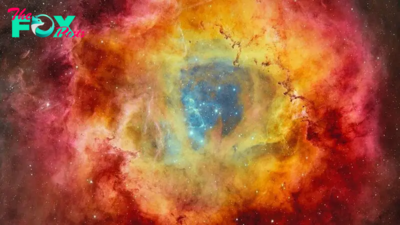Science
Astronomers find black hole's favorite snack: 'The star appears to be living to die another day'
Astronomers have succeeded in forecasting the meal timings of a colossal black hole after watching it devour a nearby star in bits and pieces, they announced earlier this week, marking a step forward in understanding the elusive eating behavior of these cosmic voids.
The data behind the forecasts was beamed home in 2018, when an automated ground-based survey flagged a surge in brightness from a galaxy roughly 860 million light-years from Earth. The flare-up — which can be likened to turning on a cosmic light switch billions of times brighter than our sun — pointed to a star being shredded and consumed by a supermassive black hole, which lurks in the center of a faraway galaxy and weighs roughly 50 million times our sun.
The star's decimated material heated up as it approached the black hole, blasting X-ray and ultraviolet emissions strong enough to be picked up by space telescopes. Those signals faded a little over a year later, hinting that the black hole had fully ingested the star. However, the signals appeared to surge once again two years later, showing that the star's core had actually survived the first pass while its outer envelopes were destroyed.
Based on telescope data about the star and its orbit, astronomers used a model to forecast the black hole's second-to-last meal before August 2023. The results were confirmed with follow-up observations taken with the Chandra X-ray telescope, which recorded the predicted drop in bright emissions beaming from the system.
Related: What would happen if a black hole wandered into our solar system?
"Initially we thought this was a garden-variety case of a black hole totally ripping a star apart," Thomas Wevers of the Space Telescope Science Institute in Baltimore, who led the 2023 observations, said in a statement. "Instead, the star appears to be living to die another day."
"The black hole was essentially wiping its mouth and pushing back from the table," Dheeraj Pasham, a research scientist at the Massachusetts Institute of Technology who led the latest study, added in the same statement.
-

 Science1d ago
Science1d agoInside Capitol Hill’s Latest UFO Hearings
-

 Science1d ago
Science1d agoYou Won’t Want to Miss the Leonid Meteor Shower. Here’s How and When You Can See It
-

 Science2d ago
Science2d agoHere’s What Trump’s Win Means for NASA
-

 Science5d ago
Science5d agoWhy Risky Wildfire Zones Have Been Increasing Around the World
-

 Science5d ago
Science5d agoIt’s Time to Redefine What a Megafire Is in the Climate Change Era
-

 Science6d ago
Science6d ago4 Astronauts Return to Earth After Being Delayed by Boeing’s Capsule Trouble and Hurricane Milton
-

 Science1w ago
Science1w agoThe Elegance and Awkwardness of NASA’s New Moon Suit, Designed by Axiom and Prada
-

 Science1w ago
Science1w agoSpaceX Launches Its Mega Starship Rocket. This Time, Mechanical Arms Catch It at Landing



























